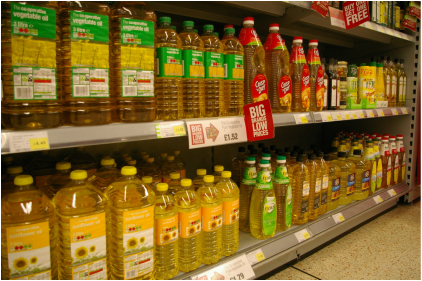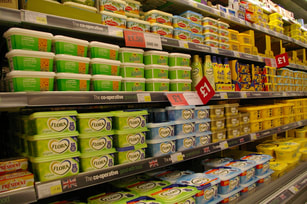uncovering the truth behind polyunsaturated seed oils.
For nigh on 50 years we have been conned into believing that consuming polyunsaturated seed oils was better for our health than traditional saturated fats. In that same time the rates of both heart disease and cancer have soared.
|
UNNATURAL‘NEW’ SEED OILS
When Surgeon Captain T.L. Cleave wrote his ground breaking book, The Saccharine Disease, way back in 1974, he warned against these ‘new’ oils, as they were thought of then, that are mainly expressed from vegetable seeds. He pointed out that many of the seed oils were not a natural food for man as they only became widely available to us after the invention of the hydraulic press and the new solvent procedures. In fact they were scarcely eaten in the United Kingdom until around 1916, during the height of the First World War, when these seed oils were used to make margarine. Margarine was probably introduced at that time to compensate for food shortages, such as supplies of butter, when foreign imports were severely curtailed as a result of the war. FOOD FOR BIRDS, NOT MEN Captain Cleave went on to say of these seed oils, ‘Evolutionarily, these oils make us not so much men as the equivalent of a flock of greenfinches, and the evolutionary incongruity is heightened by the fact that the coronary explosion amongst us, as will be seen later, came in since the introduction of just these oils at the period stated, though in margarine they are often saturated by a stream of hydrogen.’ FALSE HEALTH CLAIMS Meanwhile, people were and continue to be seduced by the false health claims of the manufacturers of these polyunsaturated seed oils. Supermarket shelves groan under the weight of bottles of oil extracted from every conceivable grain or seed. The list includes rape seed, corn, sunflower, safflower, cotton and now watermelon seed, grape seed and others are being considered as ways to make use of seeds that were, until recently, considered waste. Until the 1960s, safflower oil was used in the paint industry but is now mostly used as a cooking oil. One look at the process of extracting vegetable seed oil, described here, would be enough to convince anyone that it is far from being a healthy product.
The process of refining vegetable oil damages the fats and makes the oils very unstable and prone to going rancid. Rancid oils in any form are particularly harmful as they can introduce cancer-causing free radicals into the body. DANGEROUS FREE RADICALS
Dr. Mary Enig and Sally Fallon from the Weston Price Foundation, point out that the high temperatures used in processing these seed oils cause the weak carbon bonds of unsaturated fatty acids, especially triple unsaturated linolenic acid, to break apart, thereby creating the dangerous free radicals mentioned earlier. In addition, these high temperatures and pressures neutralize or destroy antioxidants, such as fat-soluble vitamin E, the very vitamin which protects the body from the ravages of free radicals. Instead, BHT and BHA, both suspected of causing cancer and brain damage, are often added to these oils to replace vitamin E and other natural preservatives destroyed by heat. (Butylated hydroxytoluene (BHT) and butylated hydroxyanisole (BHA) and are two preservatives used by manufacturers to keep fats from going rancid). Dr. Natasha Campbell-McBride, describes in her book ‘Gut and Psychology Syndrome’ her belief that many ailments that afflict children today such as allergies, learning and behavioural problems, hyperactivity and even autism, are largely as a result of the consumption of highly processed food and, in particular, the modern polyunsaturated seed oils which have almost exclusively replaced traditional saturated fats. There is not much profit to be made from natural fats so it is in the food industry’s interest to convince people that natural fats are harmful to health and that their ‘new’ processed fats and hydrogenated cooking oils are better. |

NO SAFE LIMIT FOR TRANS FATS
Dr. Natasha explains that when vegetable oils are hydrogenated they form trans-fats or trans fatty acids which are very similar to their natural counterparts, but they are somewhat ‘back to front’. Because they are similar they take the place of the essential fats in the body but they are unable to do their job. It is as if they make the cells disabled. All organs and tissues in the body are affected. Trans fats can be very detrimental to the immune system and, according to Dr. Natasha, have been implicated in diabetes, atherosclerosis, cancer, neurological and psychiatric conditions. She believes that trans fats are so harmful there is no safe limit for them and yet some people eat them every day in packets of crisps, margarine, snack bars, processed cheese and of course, anything that contains vegetable oils. FOODS NEW TO DIGESTIVE SYSTEM So much of the food eaten regularly today has been highly processed and as such is entirely new to the human digestive system. Years ago everyone ate saturated animal fats. Ask anyone in their 70’s or 80’s about the school dinners they had when they were young and they will wax lyrical about the suet puddings and suet crust pastry that were the staple diet for fast growing adolescents at that time. Bread spread with dripping from the weekend joint was a special teatime treat.  Barry Groves Ph.D. Barry Groves Ph.D.
ANIMAL FATS NOT TO BLAME
Barry Groves, PhD, author and lecturer on Nutritional Science, points out, “Saturated fats and animal fats are usually blamed for all manner of diseases in Western society. But look at the facts: In the 19th-century, when animal fats were all that was available, cancers were rare, as was heart disease. Polyunsaturated fats and oils are used to suppress the immune system, such immunosuppression is known to cause cancers to start and promote cancer. In this last century there has been a change in favour of polyunsaturated fats and oils — and cancer rates have soared. Unfortunately, as polyunsaturated fatty acids are also essential to the body; we must have some. So a proper balance must be struck. Whether the dramatic increase in the numbers of cancers in the last century was as a result of a similarly dramatic rise in our intake of polyunsaturated vegetable oils is not known — but the evidence strongly favours such a conclusion. Under the circumstances, it seems prudent to get what linoleic acid we need from animal sources or to restrict polyunsaturated oil consumption so that linoleic acid is no more than three percent of the total fat intake”. Ross Hume Hall, PhD, in his acclaimed book ‘Food for Nought’, written in 1976, lamented the fact that very little research had been done on the effects of these seed oils on people’s health before they were launched on the market. He observed, ‘Nevertheless, in spite of the lack of information, medical scientists for a generation have promoted the eating of commercially processed vegetable fat (oil) in lieu of butter and other animal fats, knowing nothing of what they recommend.’ HEALTHY TRADITIONAL OILS Whilst oils manufactured from seeds are harmful, as described earlier, traditional oils obtained from the flesh or nut of a fruit such as the olive or walnut are nutritious, provided they are cold pressed. These oils have been in use since biblical times. They are are best used cold as accompaniments for salads rather than for cooking as high temperatures can harm their nutritional value.. We have now arrived at the second or maybe even the third generation of people who do not know any other way to cook or prepare food without using these polyunsaturated seed oils. The saturated animal fats that everyone cooked with before these oils became widely available were falsely targeted as being the cause of many modern diseases, especially heart disease, although why animal fats that we have been eating since time immemorial should suddenly become dangerous to health is difficult to understand and totally illogical. SIMPLE SOLUTION The solution is simply to shun these ‘new’ highly processed foods and return to traditional animal fats such as butter, lard, and duck fat for use in preparing meals and cooking, just as our grandparents did at a time when cases of cancer and heart disease were rarely seen. |
wisdom of tribal people
With so much ill health linked to these processed, manufactured foods, the situation has become desperate. The question that has to be asked is, if polyunsaturated seed oils are as important to our health as we have been led to believe, how is it that the human race has managed to evolve over many thousands of years, until now, without them? Tribal people and other isolated communities living far away from the influence of the Western World have a great deal to teach us, as was proved by Weston Price after his travels around the globe in the 1930’s. A short video describing what he discovered and the sort of traditional foods we should be eating can be seen on this website, click on the link below :
www.youtube.com/watch?feature=playerembedded&v=b-WKkCIpNxQ
www.youtube.com/watch?feature=playerembedded&v=b-WKkCIpNxQ
References:
Vegetable oil: A Nasty Process. www.healthy-eatings-poitics.com/vegetable-oil.html
The Saccharine Disease Surgeon Captain T.L. Cleave FRCP
Food for Nought. Prof. Ross Hume Hall
Gut and Psychology Syndrome. Dr. Natasha Campbell-McBride
Vegetable oil: A Nasty Process. www.healthy-eatings-poitics.com/vegetable-oil.html
The Saccharine Disease Surgeon Captain T.L. Cleave FRCP
Food for Nought. Prof. Ross Hume Hall
Gut and Psychology Syndrome. Dr. Natasha Campbell-McBride

